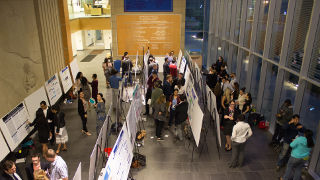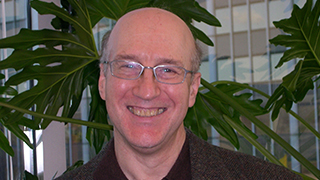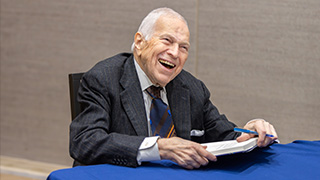11th Annual Biological Sciences Symposium
Thursday, April 12, 2018

David Goldman, M.D. has been Chief of the Laboratory of Neurogenetics at NIAAA (National Institute on Alcohol Abuse and Alcoholism) since 1991 and Clinical Director of NIAAA since 2015. He graduated cum laude from Yale University (B.S., 1974) and graduated magna cum laude from the University of Texas Medical Branch, Galveston (M.D., 1978) and was a Resident in Psychiatry there in 1979. Dr. Goldman joined the NIAAA in 1979 and was an NIMH (National Institute of Mental Health) Clinical Associate 1980-1984, before rejoining NIAAA in 1985.

Dr. David Goldman
Dr. Goldman is a Fellow of the American College of Neuropsychopharmacology. His awards include the NIH Director's Award (twice), Distinguished Researcher Award from the Research Society on Alcoholism, an award from the British Medical Association for his book, "Our Genes, Our Choices," and the James Isaacson Research Award of the International Society for Biological Research on Alcoholism. Throughout his career, Dr. Goldman has focused on the identification of genetic factors responsible for inherited differences in behavior and has authored over 400 papers. These include several of the first "imaging genetics" studies. He and his group are increasing reliant on genomic methods including sequencing, genome-wide association, and epigenetic studies, for identifying genes that influence behavior.
Dr. Goldman's current research identifies genes that influence vulnerability to alcoholism, other addictions and other psychiatric diseases. His laboratory uses a combination of genomic, intermediate phenotype and functional genetic methods to identify functional variants that ultimately influence vulnerability to causally complex psychiatric diagnoses via their effects on molecules and neural functions that mediate these behaviors.
The Biosymposium is open to SHU students, faculty, alumni and the public and provides an opportunity to discuss ongoing research projects being conducted in the Department of Biological Sciences. Both graduate and undergraduate students will present their data on a diverse range of topics pertaining to the life sciences. Refreshments will be served during the poster session. For questions about the event, please contact Dr. Ed Tall, Faculty Associate of Biological Sciences.





